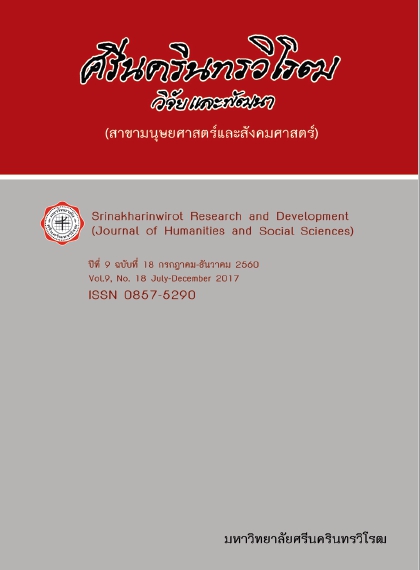บทเรียนการพัฒนาหมู่บ้านในโครงการพัฒนาพื้นที่ราบเชิงเขา จ.สระแก้ว-ปราจีนบุรี ตามพระราชดำริ (THE LESSON-LEARNT FROM DEVELOPMENT OF VILLAGE IN THE MOUNTAINOUS PLAIN DEVELOPMENT PROJECT OF SAKAEO - PRACHIN BURI UNDER ROYAL INITIATIVE)
Abstract
การวิจัยนี้มีวัตถุประสงค์ คือ 1) พัฒนาเกณฑ์การประเมินหมู่บ้านตามแนวทางพัฒนาของโครงการพัฒนาพื้นที่ราบเชิงเขาจังหวัดสระแก้ว-ปราจีนบุรี ตามพระราชดำริ 2) ประเมินผลการพัฒนาหมู่บ้านในพื้นที่เป้าหมายของโครงการฯ
และ 3) ถอดบทเรียนการพัฒนาหมู่บ้านในพื้นที่เป้าหมายของโครงการฯ ที่ผ่านเกณฑ์ที่กำหนด ซึ่งกลุ่มตัวอย่างที่ใช้ในการวิจัยครั้งนี้ คือ หมู่บ้านเป้าหมายที่อยู่ในโครงการฯ จำนวน 14 หมู่บ้าน เครื่องมือที่ใช้ในการเก็บรวบรวมข้อมูลครั้งนี้ คือ แบบสัมภาษณ์ และแบบสอบถาม ผลการวิจัย พบว่า
- เกณฑ์การคัดเลือกหมู่บ้านฯ มี 3 แนวทาง คือ 1) แนวทางการพัฒนาจิตใจ ประกอบด้วย 3 ตัวชี้วัด
คือ ความสามัคคี ข้อกำหนดและการปฏิบัติของหมู่บ้าน และกิจกรรมเกี่ยวกับคุณธรรมและจริยธรรมในการดำเนินชีวิต 2) แนวทางการพัฒนาด้านความรู้เพื่อการประกอบอาชีพ ประกอบด้วย 4 ตัวชี้วัด คือ การบริหารจัดการด้านเศรษฐกิจ การเรียนรู้และสืบทอดภูมิปัญญาท้องถิ่น การอนุรักษ์สิ่งแวดล้อม และการสร้างเครือข่ายความร่วมมือ 3) แนวทางการจัดระบบการใช้ที่ดินเพื่อทำกินและที่อยู่อาศัย ประกอบด้วย 2 ตัวชี้วัด คือ การจัดระบบการใช้ที่ดินตามทฤษฎีใหม่
และสภาพความเป็นอยู่และสาธารณูปโภคของที่อยู่อาศัย - ความคิดเห็นของคณะกรรมการหมู่บ้านต่อการดำเนินงานพัฒนาตามพระราชดำริเมื่อเทียบกับเกณฑ์ ด้วยวิธีการทดสอบที (One Sample t-test) พบว่า คณะกรรมการหมู่บ้านมีความคิดเห็นต่อการดำเนินงานพัฒนาตามพระราชดำริของโครงการฯ ในภาพรวมอยู่ในระดับปานกลาง (= 3.44) ไม่สูงกว่าเกณฑ์ที่กำหนด หากพิจารณาในแต่ละแนวทางพัฒนา พบว่า การดำเนินงานพัฒนาด้านจิตใจ อยู่ในระดับมาก (= 3.87) สูงกว่าเกณฑ์ที่กำหนดอย่างมีนัยสำคัญทางสถิติที่ระดับ .05 ส่วนการพัฒนาความรู้เพื่อการประกอบอาชีพ อยู่ในระดับปานกลาง ( = 3.40) ไม่สูงกว่าเกณฑ์ที่กำหนด และการจัดระบบการใช้ที่ดินเพื่อทำกินและที่อยู่อาศัย อยู่ในระดับปานกลาง ( = 3.05) ต่ำกว่าเกณฑ์ที่กำหนดอย่างมีนัยสำคัญทางสถิติที่ระดับ .05 ทั้งนี้หมู่บ้านเป้าหมายที่ผ่านการคัดเลือก จำนวน 4 หมู่บ้าน คือ หมู่บ้านคลองน้ำเขียว คลองคันโท ซับสมบูรณ์ และทับลาน ซึ่งหมู่บ้านทับลานจะให้ความสำคัญต่อการพัฒนาความรู้เพื่อการประกอบอาชีพเป็นอันดับแรก อีกสามหมู่บ้านที่อยู่ในจังหวัดสระแก้ว ให้ความสำคัญต่อการพัฒนาจิตใจเป็นอันดับแรก ซึ่งหน่วยงานที่เกี่ยวข้องควรส่งเสริมให้หมู่บ้านจัดระบบการใช้ที่ดินตามทฤษฎีใหม่ที่เหมาะสมกับลักษณะการประกอบอาชีพของประชาชนในหมู่บ้านซึ่งถือเป็นการน้อมนำปรัชญาของเศรษฐกิจพอเพียงมาใช้เพื่อให้มีภูมิคุ้มกันต่อการเปลี่ยนแปลงของสังคมในยุคโลกาภิวัตน์
- บทเรียนการพัฒนาหมู่บ้านเป้าหมายที่ผ่านการคัดเลือก พบว่าความสำเร็จของการดำเนินงานพัฒนาของหมู่บ้านในโครงการฯ ต้องอาศัยการมีส่วนร่วมและความสามัคคีของชาวบ้าน การได้รับการสนับสนุนจากหน่วยงานของราชการแล้ว การมีผู้นำที่เข้มแข็งและเสียสละ ส่งผลให้เกิดประสิทธิผลของงาน และทรัพยากรธรรมชาติและการอนุรักษ์สิ่งแวดล้อมถือเป็นต้นทุนสำคัญของการพัฒนาหมู่บ้านเพื่อให้เกิดความยั่งยืน
The purposes of this research are as follows: 1) to develop criteria on evaluation the village in the Mountainous Plain Development Project of Sakaeo – Prachin Buri under Royal Initiative; 2) to assess result of the development of the villages in target area of the project; and 3) to obtain lesson learnt from the development of the qualified villages in these target area of the project. The sampling of the research is 14 villages of the project. The research instruments are in the interview form and questionnaire.
The research findings are as follows:
- There are three criteria in selecting sampling group of the village in the Mountainous Plain Development Project of Sakaeo – Prachin Buri under Royal Initiative are:
1) Mental development consisted of 3 indicators namely, unity, rules and regulations of village, and virtuous and ethical activities of conducting people’s living;
2) Guideline of career development which consists of 4 indicators namely, management of economics, learning and inherit the folk wisdom, environmental conservation ,and networking co-operation;
3) Guideline of land management for earning their living and dwelling which composes of 2 indicators namely the new theory of land management, and, living condition and public utilities.
- The opinion of village council on proceeding with the development under Royal Initiative applied by One-Sample t-test is found out that it is moderate in general (= 3.44) and not higher than the criteria. However, upon considering on each guidelines of development, mental development is intense (= 3.87) and higher than criteria which is at statistical significance of .05, but developing knowledge for earning their living is moderate ( = 3.40) and not higher than the criteria. Whereas, guideline of land management for earning their living and dwelling is at moderate rate ( = 3.05) and lower than criteria which is at statistical significance of 05. The selected sampling group of village is 4 villages namely Klong Namkeaw Village, Klong Kantho Village, Sub Somboon Village, and Tab-larn Village. The opinion of each village council is different as follows:
The committee of Tab-larn Village focuses on developing knowledge for earning their living as the first priority. Meanwhile, committees of the other 3 villages in Sa-kaeo Province focus on mental development. Therefore, related governmental agencies should encourage and support the village to apply land management under the new theory that is appropriate with the characteristic of people’s earning which will be in accordance with the Philosophy of Sufficiency Economy. This practice allows the people to adapt themselves to the changing of society in the globalization era.
- The lesson learnt is found out that success of the development on target villages is not only people’s participation and unity, supports from governmental agencies; but it is also having determined and dedicated leaders. All these components enable efficiency in the result of development, whereas natural resources and environmental conservation that are social cost for developing the villages sustainably.
Downloads
References
แห่งชาติ ฉบับที่ 11 พ.ศ. 2555 – 2559. สืบค้นเมื่อ 12 กรกฎาคม 2557 จาก http://www.nesdb.go.th/
Default.aspx?tabid=395
[2] ห้องแรงบันดาลใจ. (2558). พระบรมราโชวาท. สืบค้นเมื่อ 14 มีนาคม 2558. จาก
http:s//sites.google.com/a/sci.kmutnb.ac.th/biotechnology/home/hxng-raeng-bandal-ci.
[3] โกวิท พวงงาม. (2553). การจัดการตนเองของชุมชนและท้องถิ่น. กรุงเทพฯ: บพิธการพิมพ์.
[4] สุภางค์ จันทวานิช; และ วรรณี ไทยานันท์. (2541). แนวคิดและเครื่องชี้วัดการพัฒนาสังคมและคุณภาพชีวิตของ
ประเทศไทย. หน้า 115-229. ใน อนุชาติ พวงสำลี และอรทัย อาจอ่ำ. (บรรณาธิการ). การพัฒนาเครื่องชี้วัด
คุณภาพชีวิตและสังคมไทย. กรุงเทพฯ: สำนักงานกองทุนสนับสนุนการวิจัย.
[5] กระทรวงมหาดไทย. (2558). แบบประเมินหมู่บ้านเศรษฐกิจพอเพียง (4 x 23 ตัวชี้วัด). สืบค้นเมื่อ 17 มีนาคม
2557 จาก www.cddburiram.com/photo1/139.doc
[6] Likert, R. A. (1932, May). “Technique for the Measurement of Attitudes”. Arch Psychological. 25(140): 1-
55.
[7] ศิริชัย พงษ์วิชัย. (2554). การวิเคราะห์ข้อมูลทางสถิติด้วยคอมพิวเตอร์. ครั้งที่ 22 กรุงเทพฯ: วี พริ้นท์ (1991).
[8] Field, Andy. (2005). Discovering statistics using SPSS. 2nd ed. London: Thousand Oaks, Calif: Sage.
[9] วิทยาลัยโพธิวิชชาลัย มศว. (2558). ฐานข้อมูลโครงการพัฒนาพื้นที่ราบเชิงราบเชิงเขาจังหวัดสระแก้ว-ปราจีนบุรี
ตามพระราชดำริ (ระยะที่ 3). กรุงเทพฯ: สหมิตรพริ้งติ้งแอนด์พับลิชชิ่ง.
[10] วรรณธรรม กาญจนสุวรรณ. (2553). การศึกษารูปแบบตัวชี้วัดและกระบวนการจัดการชุมชนเข้มแข็งของไทย.
ดุษฎีนิพนธ์ (รัฐศาสตร์). อุบลราชธานี: บัณฑิตวิทยาลัย มหาวิทยาลัยอุบลราชธานี.
[11] กวนน้ำให้ใส. (2559). ยึดที่ดินคนรวยที่ครอบครองผิดกฎหมาย นำไปจัดสรรให้คนจน. สืบค้นเมื่อ 12 มกราคม
2560, จาก http://m.naewna.com/view/columntoday/25240
[12] มูลนิธิชัยพัฒนา. (2558). เศรษฐกิจพอเพียง. สืบค้นเมื่อ 12 มีนาคม 2558 จาก http://www.chaipat.or.th/
chaipat/content/porpeing/porpeing.html# porpeing1.
[13] สหัทยา พลปัถพี. (2548). การนำเสนอแนวทางการพัฒนาคนให้มีคุณลักษณะตามปรัชญาของเศรษฐกิจพอเพียง.
สืบค้นเมื่อ 17 มีนาคม 2559, จาก http://www.csr.chula.ac.th/sufficiency_economy/thesis.html
[14] นพมาศ อุ้งพระ.(ธีรเวคิน) (2555). จิตวิทยาสังคม. กรุงเทพฯ: สำนักพิมพ์มหาวิทยาลัยธรรมศาสตร์.
[15] อัมพวัลย์ วิศวธีรานนท์; และ ศิริวรรณ วิบูลย์มา (2559). ชุมชนเข้มแข็งสร้างกรุงเทพฯ ยั่งยืน: ตัวชี้วัดและ
บทเรียนความสำเร็จของชุมชน. วารสารศรีนครินทรวิโรฒวิจัยและพัฒนา (สาขามนุษยศาสตร์และ
สังคมศาสตร์). 8(15): 182-194.
[16] อนุชา พิมายนอก; และ ภควรรณ ลุนสำโรง. (2558). ปัจจัยที่เอื้อต่อความสำเร็จในการพัฒนาชุมชนตามแนวทาง
ปรัชญาเศรษฐกิจพอเพียงของชุมชน บ้านน้าซับ ตาบลวังน้ำเขียว อำเภอวังเขียว จังหวัดนครราชสีมา. สืบค้น
เมื่อ 17 มีนาคม 2559, จาก http://journal.nmc.ac.th/th/admin/Journal/2558Vol3No1_78.pdf
Downloads
Published
How to Cite
Issue
Section
License
Srinakharinwirot Research and Development Journal of Humanities and Social Sciences is licensed Under a Creative Commons Attribution-NonCommercial-NoDerivs 4.0 International (CC-BY-NC-ND 4.0) License, Unless Otherwise Stated. Please Read Journal Policies Page for More Information on Open Access, Copyright and Permissions.



